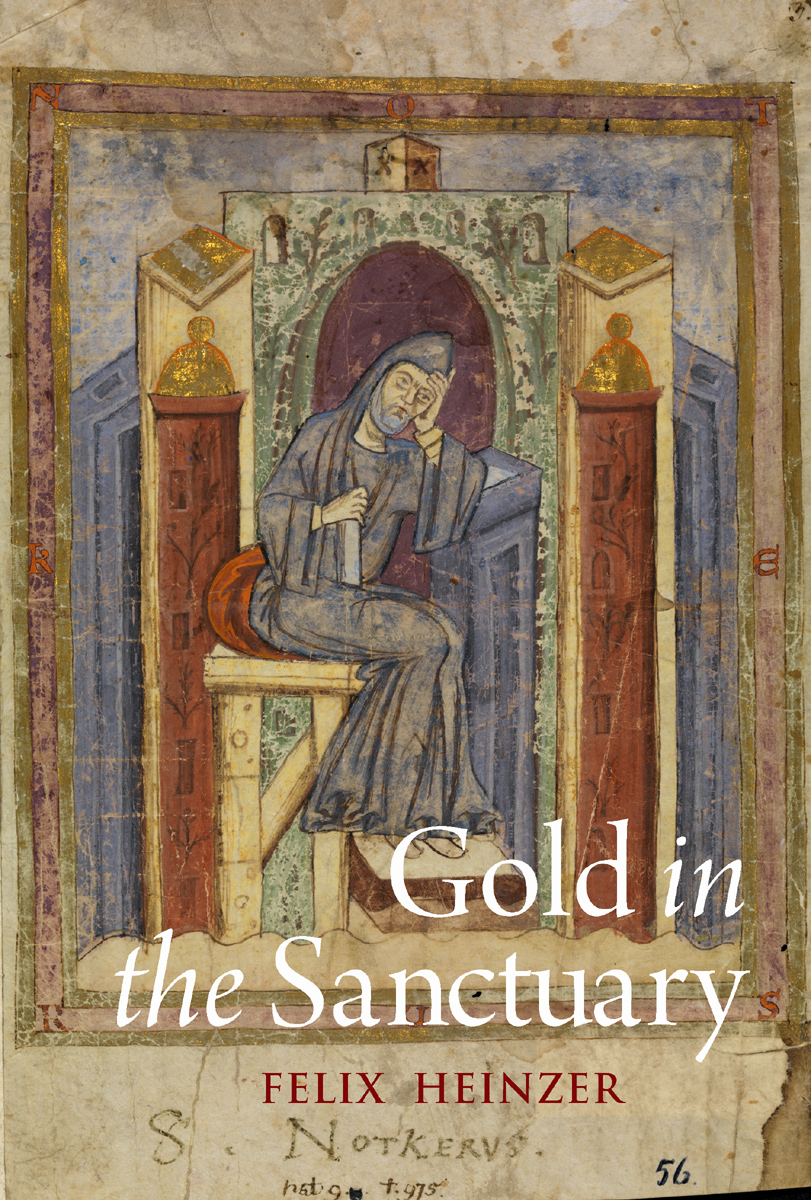
Gold in the Sanctuary: Reassessing Notker of St Gall’s Liber Ymnorum
Studies and Texts 228 • xvi, 290 pp. plus 12 colour plates • ISBN 978-0-88844-228-4 • Cloth • $95
A meticulous reading of Notker of St Gall’s texts and their backgrounds, as well as the exploration of their multifaceted reverberation in literature and art, allow for retracing the story of a significant if forgotten aspect of the poetic tradition in the Latin Middle Ages.
As Peter Dronke observed in his seminal book on the subject, the first heights of achievement in medieval lyric in the Latin West associated with Gottschalk of Orbais (d. ca. 869) and, even more so, with Notker of St Gall, “occur in the religious mode, in the second generation after Charlemagne, more than two and a half centuries before secular and vernacular lyrics survive in any abundance.” Ironically, it would be religious authority again that in the late sixteenth century would decide the fate of Notker’s Liber Ymnorum by banning the singing of sequences from liturgical chant. Indeed, the criticism that emerged in the wake of both the Tridentine Council and the Protestant Reformation recalls Notker’s own awareness of the objections, particularly virulent in the west-Frankish realm, leveled against poetical additions to an established chant repertory overwhelmingly based on biblical texts.
The first part of this study is thus dedicated to the strategies Notker adopted to legitimize his endeavor, while attempting to navigate the faultline between scriptural tradition and poetical adornment, between cult and culture. His decision to emulate the structure of Old Testament poetry, especially the Psalms, instead of following the well-worn track of earlier Christian poetry that cleaved to classical metrical schemes, remains fundamental. The second part focuses on Notker’s reception, in particular on the posthumous idealization of the stammering poet as a charismatic author, but it also draws attention to the promotion of his work as an undisputed part of liturgical practice up to early modern times.
Excerpt
The preface and an excerpt from the introduction
Author
Felix Heinzer retired as Professor of Medieval Latin at the University of Freiburg in 2015. Currently Senior Professor at the Centre for the Study of Manuscript Cultures, Hamburg, he has also been a visiting scholar at the Centre for Medieval Studies and the Pontifical Institute of Mediaeval Studies, Toronto, the University of California, Berkeley, and the Stanford Humanities Center.
Formerly curator of manuscripts at Stuttgart, Württembergische Landesbibliothek (1988–2005), his scholarly interests center on monastic libraries and their holdings, especially in the area around Lake Constance and the Upper Rhine, and on the liturgy and sacred poetry of the Latin Middle Ages. Extensive work in these fields includes Klosterreform und mittelalterliche Buchkultur im deutschen Südwesten (2008), Hermann der Lahme: Reichenauer Mönch und Universalgelehrter des 11. Jahrhunderts, co-edited with Thomas Zotz (2016), and “Medial Ambiguity: Liturgical Books of the Latin Church and Their Changing Status in Mediaeval Tradition,” Manuscript Cultures 10 (2017).
Endorsement
“In this rich study of the Liber Ymnorum of Notker Balbulus, Felix Heinzer explores the quality of Notker as a poet composing for the liturgy, using textual and theological analysis to illuminate a major instance of Carolingian creativity. In a first part, Heinzer examines this poetry in its own time, arguing that Notker envisioned his labours as an emulation of the biblical psalms. In a second part, Heinzer traces the long afterlife of the Liber Ymnorum, far beyond the Abbey of St Gall and reaching into the early modern period. At the heart of Heinzer’s broad-ranging contextualization of Notker’s work is his conviction that Notker’s sequences must be considered ‘a valuable part of the premodern literary and religious culture of the Latin West.’ Heinzer is sure-footed in his recognition of musical structures as fundamental to Notker’s creative ideas, while the vividness of his philological and theological analyses offers remarkable new insights.” — Susan Rankin, University of Cambridge
Ordering
Customers in North America please order through University of Toronto Press Distribution by phone (1-800-565-9523) or by email (utpbooks@utpress.utoronto.ca). If you would like to order through UTP Distribution using another method such as mail or fax, please click here for a full list of contact and ordering methods. PIMS books are also available on Amazon.ca (for Canadian customers) and Amazon.com (for customers in the U.S.).
Customers outside North America please order through Brepols Publishers. PIMS books are available through the Brepols online catalogue.


